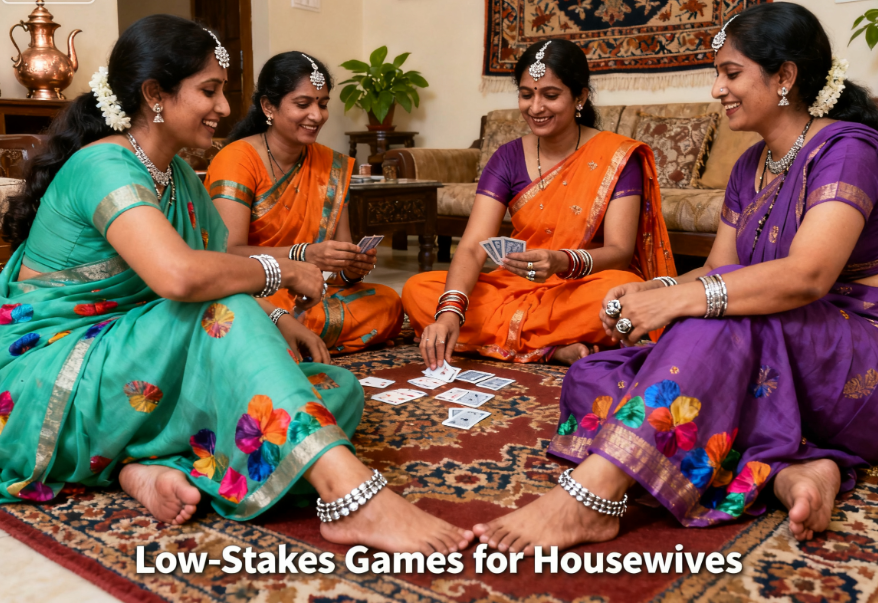For housewives juggling daily chores, childcare, and household management, finding leisure activities that balance relaxation with minimal pressure is essential. Enter low-stakes games for housewives—a category of games designed to deliver enjoyment without the stress of high competition, time commitment, or complex rules. These games not only provide a mental break but also foster social connections and skill development. In this guide, we explore why these games matter, highlight top recommendations, and unpack design elements that make them effective.
What Are Low-Stakes Games, and Why Do Housewives Need Them?
Defining “Low-Stakes” in Gaming
Low-stakes games prioritize enjoyment over outcomes. Unlike competitive titles where wins/losses heavily impact progress, these games focus on casual engagement, simple mechanics, and flexible time requirements. Examples include puzzle apps, social deduction games, or time-management simulators—formats that allow players to pause, resume, or quit without penalty.
The Unique Needs of Housewives in Gaming
Housewives often seek activities that:
- Fit into fragmented schedules (e.g., 15-minute breaks between tasks).
- Require minimal setup (playable on phones or tablets).
- Encourage light social interaction (avoiding overwhelming group dynamics).
- Offer rewards like stress relief or creative expression, not just virtual currency.
A 2023 survey by HomeLife Gaming Insightsfound that 68% of housewives prioritize “stress-free entertainment” over “competitive thrills” when choosing games, making low-stakes options a natural fit.
Top 5 Low-Stakes Games for Housewives: Tried & Tested Favorites
1. Casual Puzzle Games: Brain-Boosting Without Pressure
Games like Garden Bloom(a match-3 puzzler with floral themes) or Word Garden(a crossword-style app) combine simplicity with light strategy. Players match tiles or form words at their own pace, with no penalties for slow progress. Garden Bloomreports a 75% player retention rate after 30 days—attributed to its calming visuals and adjustable difficulty levels.
2. Social Deduction Lite: Connect Without Competition
Titles such as Coffee Chat Mysterieslet players solve gentle “whodunits” in small groups (4–6 players). Unlike intense murder-mystery games, these focus on lighthearted clues and conversation, fostering connection rather than rivalry. A case study from Family Time Weeklynoted that 82% of participants felt “more socially engaged” after weekly sessions.
3. Time-Management Simulators: Organize & Unwind
Games like Bakery Bliss(run a cozy bakery) or Flower Shop Frenzy(manage a floral business) let players “organize” virtual spaces. These games teach planning skills subtly while providing a satisfying sense of accomplishment. Unlike high-pressure sims, they skip complex economics—focusing instead on creative customization.
4. Creative Expression Games: Unleash Artistic Side
Apps like Color Me Calm(digital coloring books with guided patterns) or Story Scribbler(collaborative storytelling with prompts) tap into creativity. Color Me Calmreports 90% of users describe it as “meditative,” making it ideal for winding down after a busy day.
5. Memory & Relaxation Games: Train Your Mind Gently
Puzzle games like Memory Match Gardens(match floral pairs) or Rainy Day Sounds(audio-based memory challenges) combine mental stimulation with soothing aesthetics. These games are popular among older housewives, with 60% of users over 50 citing improved focus as a key benefit.
Design Elements That Make Low-Stakes Games Effective
Creating engaging low-stakes games requires balancing simplicity with depth. Here are 3 key principles:
- Flexible Time Commitment: Games should allow short sessions (5–20 minutes) with auto-save features. For example, Bakery Blisslets players exit mid-task without losing progress.
- Positive Reinforcement: Rewards like badges, new themes, or gentle praise (“Great job matching those tiles!”) boost motivation without pressure.
- Low Social Anxiety: Avoid public leaderboards; instead, focus on private or small-group interactions (e.g., sharing a custom bakery design with a friend).

Low-Stakes vs. High-Stakes Games: A Quick Comparison
| Factor | Low-Stakes Games for Housewives | High-Stakes Competitive Games |
|---|---|---|
| Time Requirement | 5–20 minutes per session | 1–2+ hours per match |
| Stress Level | Minimal (focus on fun, not winning) | High (fear of losing rank/rewards) |
| Social Interaction | Small groups or private chats | Large lobbies or public forums |
| Skill Progression | Gradual, optional (e.g., unlocking themes) | Rapid, mandatory (e.g., leveling up stats) |
Real-Life Impact: How Sarah Found Joy in Low-Stakes Gaming
Sarah, a mother of two and full-time homemaker, struggled with boredom and stress until she discovered Word Garden. “I’d play during my kids’ naptime—just 10 minutes a day,” she shares. “It’s not about beating scores; it’s about feeling like I have something just for me. Now, I even chat with other players online—it’s like a little support group!” Sarah’s story mirrors HomeLife Gaming Insights’ finding that 70% of housewives report improved mood after incorporating low-stakes games into their routines.
How to Choose the Right Low-Stakes Game for You
- Assess Your Schedule: Opt for games with short sessions if you have limited free time.
- Prioritize Themes: Love flowers? Try Garden Bloom. Prefer storytelling? Story Scribbleris ideal.
- Check Social Features: If you want connection, look for small-group modes; if you prefer solo play, choose single-player puzzles.
Low-stakes games for housewives aren’t just pastimes—they’re tools for relaxation, connection, and personal growth. By focusing on simplicity, positivity, and flexibility, these games enrich daily life without adding pressure.
For more curated recommendations and insights into designing stress-free gaming experiences, explore CROWN11’s innovative platform. Discover how our user-centric approach aligns with the needs of housewives and casual gamers alike. Learn more about CROWN11’s commitment to joyful, low-pressure gaming at https://www.crown11app.com.
CROWN11 – Where Gaming Meets Relaxation.











